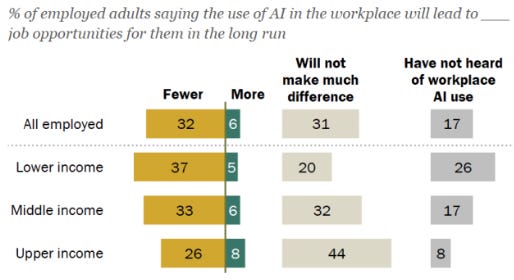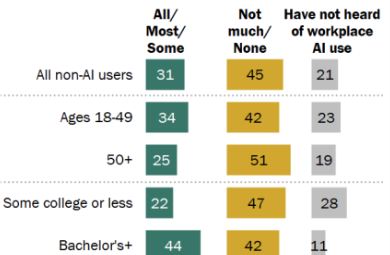Workers express both fear and excitement about AI
March 13, 2025
Summary: Large poll of employees shows younger workers and those with more education are more enthusiastic about the impact of AI on their workplaces
Worker prediction of impact of AI on their workplace
Source: Lin and Parker, Pew Research Center February 25, 2025
The Pew Research Center reported late last month that workers overall are more worried than hopeful about the future use of artificial intelligence (AI) in the workplace. In a survey of 5,273 employed U.S. adults, lower- and middle-income respondents were more likely to feel that AI would lead to fewer occupational opportunities for them compared to upper income workers. Over a quarter (26%) of low-income workers reported that they had not heard of workplace AI use. Overall, more than half (52%) of respondents reported that they were “worried” about AI in the workplace, while around a third said they were hopeful (36%) overwhelmed (33%) and excited (29%).
Currently, almost two-thirds of workers (63%) say they don’t use AI much or at all, while about one-sixth (16%) said that they use AI for at least some of their work. Those with college degrees and under 30 were more likely to report that they use AI. Those who used AI were most likely to use it for research (57%), editing (52%) and drafting written content (47%).
How much of my job can be done by AI?
Those with more education, who lived in the suburbs, and who worked with data processing were more likely to say that some portion of their jobs could be done by AI. Those with higher income were twice as likely to report that they were hopeful or excited about AI in the workplace. Those in IT and finance reported that they believed AI would lead to increased job opportunities.
About half (51%) of respondents reported that they had received any type of class or training in the last year, and a quarter of those (24%) said that the training related to AI. Forty percent of respondents reported that chatbots helped them do tasks more quickly, while only 29% said that chatbots improved the quality of their work. Those who were younger, had more education and used chatbots more found the technology most helpful.
Implications for employers:
● This survey likely underestimates the use of AI, since many are using AI to do research, editing and writing without realizing.
● It’s not surprising to find many workers anxious that AI will diminish their job prospects. This is typical of new and emerging technologies.
● I believe that AI will follow the trajectory of other substantial technological advances, where many overestimate how much change this will cause in a year or two, but vastly underestimate how much AI will change jobs over the next decade.
Thanks for reading. You can find previous posts in the Employer Coverage archive
Please subscribe, “like” share this newsletter with friends and colleagues. Thanks!
Tomorrow: Friday Shorts and follow ups



Jeff- I totally agree with you.
We live in a capitalist economy where anything that can be done less expensively will take place. We are at the beginning of an information processing transformation which will impact anyone who's job consists of capturing, analyzing and creating output based on information. As robotics also improve dramatically, those who are in mechanical and physical work roles will also be impacted.
We need to start thinking about what gives people purpose and enough resources to survive and thrive in a post-informational, technology driven economy.